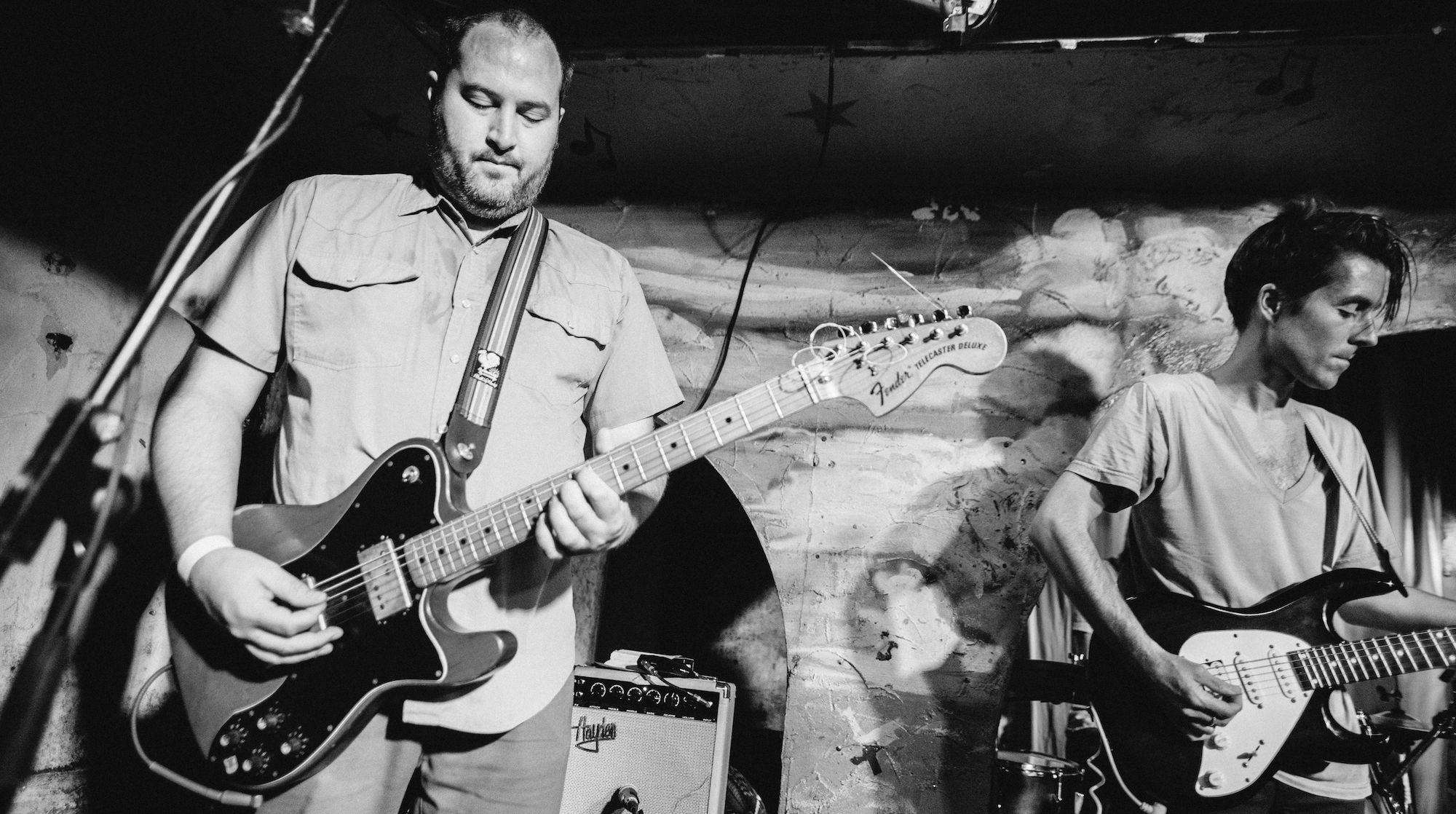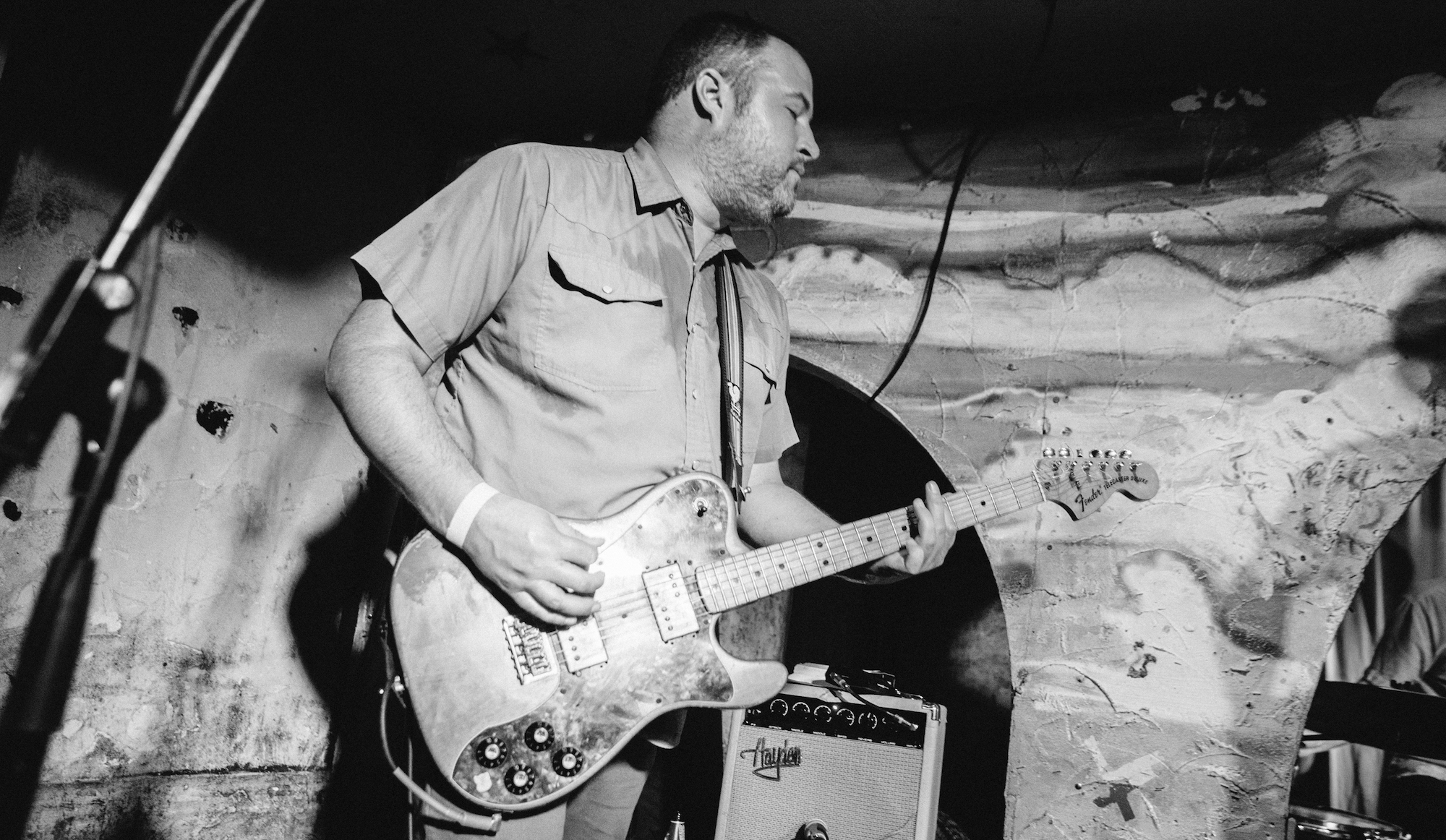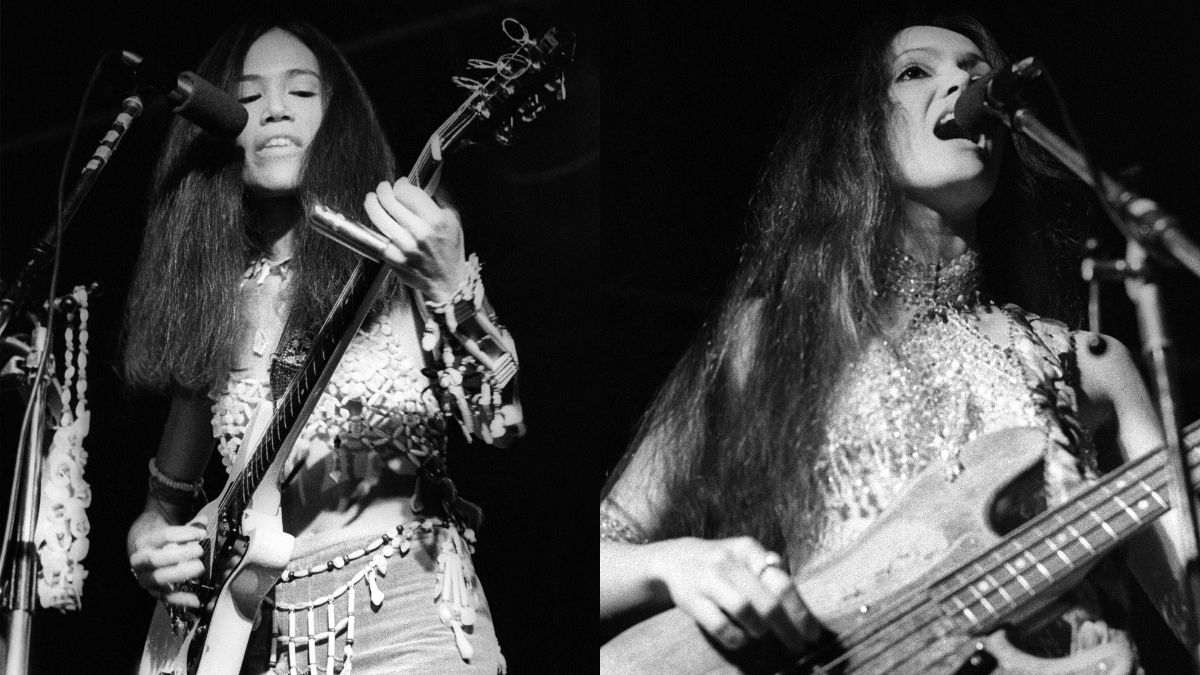The Van Pelt: "Skill does not write a good song. Louie Louie is better than any song Joe Satriani’s written, but the more skillful you are, the easier it is to execute your vision"
Armed with a Music Man Silhouette copy, Tele Deluxe, and a Walrus Audio reverb pedal, returning indie guitar titans Chris Leo and Brian Maryansky showcase their unique musical language on the Van Pelt's electrifying new LP, Artisans & Merchants

All the latest guitar news, interviews, lessons, reviews, deals and more, direct to your inbox!
You are now subscribed
Your newsletter sign-up was successful
There’s plenty of music history coursing through the Van Pelt’s latest album, Artisans & Merchants. For starters, it’s the first formal studio release from the New Jesey-formed quartet since the late ‘90s, back when the band straddled the indie-to-emo line alongside contemporaries like Braid, the Promise Ring, Joan of Arc, and Tsunami.
Thematically, Artisans & Merchants finds vocalist/guitarist Chris Leo contemplating the Van Pelt’s time on the house show circuit (Punk House), though he also considers the personal ways we entwine with the music of others, as on the Television-celebrating Did We Hear the Same Song. While it’s a welcome return, it’s taken the Van Pelt awhile to get here.
The roots of Artisans & Merchants date back to 2014, as the band began rehearsals for a European reunion tour at a friend’s farmhouse in Ferrara, Italy. Naturally, they picked up where they left off by relearning the high-voltage indie of their 1996 debut, Stealing From Our Favorite Thieves, as well as the delicate, determinedly clean-channel drive of their 1997 follow-up, Sultans of Sentiment.
While it felt good to get into the old songs at the farmhouse, Leo and guitarist Brian Maryansky admit to Guitar World that they couldn’t help but steer the band into the contemporary that day as well, ultimately stockpiling dozens of song ideas – some of which would later be laid to tape at Philadelphia's Uniform Recording in 2021.
As with the varying poles of their first two full-lengths – or how the demos of what would become Imaginary Third (an album of previously unreleased, late-'90s-era Van Pelt tracks that was released in 2014) were later fleshed out with Leo’s next band, The Lapse – Artisans & Merchants continues the Van Pelt’s sonic evolution. In the early days, Leo’s intricately spiraled-out rhythms somehow co-existed with a vocal performance that unfurled as a sometimes-panicked, freeform poetic.
Though that twitchiness still exists on newer pieces like Grid, Leo explains that he’s since settled into a sparer style of guitar playing, and that his vocals are now “a little more sing-songy” than before. While the record dishes on their time in the Punk House, the singer-guitarist connects this aesthetic to a broad range of influences.
“In some ways, I think of myself as if the blues were to be wrapped up in New York No Wave,” Leo explains. “You imagine a blues guy, he sings something and then he plays something – like a call and response thing. The vocals and the guitar almost share the same space – it’s a constant dialogue I have with myself. They’re both doing the same spartan thing, but when should one shut up and give the other one space?”
All the latest guitar news, interviews, lessons, reviews, deals and more, direct to your inbox!
As it stands, Leo’s spatial awareness also opened up things for Maryansky’s playing on Artisans & Merchants. While the guitarist began expanding his pedalboard when he was playing with beloved indie outfit Jets to Brazil, Artisans & Merchants is the first Van Pelt release to really dial into those dreamy phasers and delays.
While paying homage to the early shoegaze innovators, Maryansky confesses the slapback-galloping he brings to the new album’s Image of Health unquestionably alludes to his love of The Edge, too. With Old Souls from Different Epochs, he delivers another first for the Van Pelt – an echo-plated, wide-vibrato guitar solo.
From the new record’s mauve-tinted miasma of effects work, to streamlined performance styles, to the best wine to pair with a Van Pelt playlist, Leo and Maryansky lovingly dished on the details of Artisans & Merchants to Guitar World.

Artisans & Merchants is a different kind of guitar album for the Van Pelt. Stealing From Our Favorite Thieves was a louder, rawer indie rock record; Sultans of Sentiment still had some of those high-gain moments, but centers more on crystal-clear cleans. This time around, the guitars are similarly wide-open, but they’re also layered in with these lush choruses, phasers, and delays. How intentional was that?
Brian Maryansky: "That’s my fault [laughs]. I think it came from finding our way, musically, when we were apart, through our bands in between. Personally, I’m super into shoegaze – I like Ride and Slowdive – [and] I started incorporating that more into the Jets to Brazil stuff.
"When Van Pelt started playing again, there was a palette for that, too. There was space in those songs for [those effects]. And it was countering a simple set-up, compared to Chris, who has more of a spartan guitar playing style and set-up at this point. Chris plugs straight into the amp, and I was filling space [with effects]."
Chris Leo: "I had a bad relationship with guitar, the decade leading up to this album."
How so?
I sold all my guitars except for one – I sold all my amps. I use my housemate’s amp now
Chris Leo
Leo: "Skill does not write a good song. Louie Louie is a better song than any song Joe Satriani’s written, but in the same breath, the more skillful you are, the easier it is for you to execute your vision. Somewhere in that dialog, I got lost, and I couldn’t figure out what I wanted to do with the guitar.
"So, I sold all my guitars except for one – I sold all my amps. I use my housemate’s amp now. And with that as well, I was ready to do something different vocally than what I’d been doing forever. It was perfect timing for Brian’s guitar to fill out all the space, and I use mine sparingly so I could focus on vocals."
What was the guitar you ended up hanging onto?
Leo: "It’s an Aslin-Dane. It’s essentially a Music Man Silhouette rip-off – a 3/4 neck, more or less – but it’s better than that, too. It’s also the easiest thing to lug around."
What’s your roommate’s amp?
Leo: "He’s got a Fender Champ. One 10-inch speaker is all I need. I love it."
Brian, do you still have the old Telecaster you’re seen playing on the back cover of Sultans of Sentiment?
Maryansky: "It’s a little corroded inside, but yeah. I bought that in ’96, and probably used it for 99 percent of the shows that I’ve played [since]. Actually, I bought a reissue when we went to Europe a couple years ago – I wasn’t going to take that [older Telecaster] out anymore [because] I realized how much it was worth. I wasn’t going to put that in the hands of United Airlines.
"It’s a Tele Deluxe, like, a ’73. It’s been through a lot. I used to tour with that in a gig bag, just literally thrown into the back of the van. I bought the thing for $600 at East Village Music in New York City. I sold a white SG to Scott Winegard from Texas is the Reason for $300 to get it.
"I was like, 'Hey, buy my guitar, so I can buy this other guitar!' I had no case, so I walked home with [the Telecaster] under my arm. I remember walking up First Avenue and being like, 'Someone’s going to hit me over the head and steal this thing.'"
Thinking on how you experimented with effects in the Jets [to Brazil] years, how long did it take for you to get to your current place with echo and delay?
In the time in between [Jets to Brazil and the Van Pelt’s reformation], I just started collecting pedals. I love delay. I love reverb. I love the Edge. I can admit it: I love U2!
Brian Maryansky
Maryansky: "The last batch of Jets songs that would never see the light of day were definitely getting into [those tones], with delay and reverb happening. I think it was just stretching out our limbs a little bit – that band was always trying to do that. We were exploring that dense, sort-of-Swervedriver guitar sound – just hitting you with everything thick and noisy. So, I was pretty into that.
"In the time in between [Jets to Brazil and the Van Pelt’s reformation], I just started collecting pedals. I love delay. I love reverb. I love the Edge. I can admit it: I love U2!"
What were the pedals you were using to create that depth and space?
Maryansky: "For reverb sounds, the Walrus Audio Fathom was used quite a bit. It can do huge, weird reverbs and normal kinds of reverb sounds as well – it's all over the record.
"For delay, I had both an MXR M169 and an MXR M292 with tap tempo, which is helpful. I think there is some Empress Super Delay in there too. I love that pedal but it almost does too much – I'd spend too much time twiddling the knobs, whereas the MXRs are pretty straightforward.
"I also had a Mattoverse Swell Delay and Mattoverse Inflection Point, which does tremolo and vibrato with tap tempo. Of course, there is likely a little MXR Phase 90 in there, and possibly some Behringer Digital Reverb."

The new record’s Did We Hear the Same Song seems to be about how certain songs stick with us, or the incidental memories we attach to music. In this specific case, that song is Television’s Marquee Moon. Chris, you reference the first line of Marquee Moon in your lyrics; the way you both hit those staccato lines also feels like a musical allusion to it. What can you say about the influence of Television on the Van Pelt, in general?
Maryansky: "Good grab, we’ve been talking about them a lot."
Leo: "Obviously they’re a huge inspiration. Sean [Greene], the bass player, brought up that he was listening to Days, which is a Television song off their second album, Adventure. He was listening to it on YouTube, and in the comments, someone said: 'This song is giving me Van Pelt vibes.' So, I went back and decided to learn Days on guitar, or at least Tom Verlaine’s parts. Let’s just say we’re kind of from the same thing.
"Formulaically, we often put things together like they do. In that song, Days, for example, when I learned it, I realized it was Brian and I in a nutshell – a spartan guitar, kind of staccato, and then what I think is Richard Lloyd making everything beautiful with these counter melodies dipping in and out. It was interesting to hear that it wasn’t just sonically, but logistically."
Maryansky: "I’m super-late to Television, admittedly, but even the one-part-song with varying degrees of change, that’s a Van Pelt thing. Sneaky!
"Nanzen Kills a Cat [off the band's second album, Sultans of Sentiment] is that sort of song. If you really broke it down to its form, we just play the same thing for ten minutes, which is awesome! It’s like [experimental Baltimore post-hardcore band] Lungfish, or something – they are the masters of driving that at you. I always felt like we took a bit of that from Lungfish, too."
There’s lore in the Van Pelt’s background of the band having turned down major label offers in the ‘90s. Who was that with?
Leo: "There were quite a few, but the one that really sticks out to me was Relativity Records. They did pretty big stuff, and then I guess they folded at some point. We liked their A&R guy. If we were to have signed with somebody, it would have made sense to do it with them, so turning them down was really kind of the definitive, 'Ok, we’re not going this route.'"
This is a big what-if, but how do you think Sultans of Sentiment – arguably the defining statement of those early years – would have turned out had you signed to a major? Like, would they have left it as sparse, or asked you to ramp up the guitars to fill out the space?
Leo: "It would’ve got dumped."
Maryansky: "It's such a weird thing – I never felt like [Sultans of Sentiment] was finished. In retrospect, that’s the best thing about it – that sparseness. I always wondered if we could’ve done more, but I know now that that was what made it cool. The first Van Pelt record was noisy guitars; everything was frenetic. I don’t know if we knew we were doing [with Sultans], but it was happening. Then we just left it alone. If we re-recorded it, I feel like we’d overdo it now."

Chris, you’re a sommelier, right? Didn’t you own a winery at some point?
Leo: "No, I had an import company for a while. I wouldn’t be growing the wine, but I would import them and distribute them across the United States. I have my own shop, and I’m also in the process of opening a bar. This all comes from touring – it’s not a tangential question. When you’re not on tour, you’re often working in restaurants and bars. And for us – a band that was always more popular overseas – it was also so easy to taste wine from all over Europe on tour.
"When I’m stateside working in food and beverage, I’m going to be wine-focused, and when I’m in Europe playing shows, I can actually find local wines [to import back to the U.S.]. It was really easy to fall into this way of life."
What wine would pair best with each respective Van Pelt record?
Leo: "I’d probably do a lambrusco for the first one – a real working man’s red, but there’s bubbles so it’s still fun. You know, you’ve worked all day at the co-op, the whistle blows, and you crack open a lambrusco.
"For Sultans, I would probably do some mysterious and enchanting white wine. Maybe something Alpine, like a strange grape from Alto Adige – one of those weird, forgotten regions of the mountains.
"With Imaginary Third, maybe I’d go for a perfect overlooked merlot, [something] everybody wants to shit on. Some of the most expensive Bordeaux are merlot-based, but no one really takes them seriously. So, lets go with a Saint-Émilion merlot. And then for Artisans & Merchants… geez, I don’t know. Hopefully something that all people at a table could find something to like in. I don’t know what that would be."
- The Van Pelt's Artisans & Merchants is available now via Spartan Records.
Gregory Adams is a Vancouver-based arts reporter. From metal legends to emerging pop icons to the best of the basement circuit, he’s interviewed musicians across countless genres for nearly two decades, most recently with Guitar World, Bass Player, Revolver, and more – as well as through his independent newsletter, Gut Feeling. This all still blows his mind. He’s a guitar player, generally bouncing hardcore riffs off his ’52 Tele reissue and a dinged-up SG.

